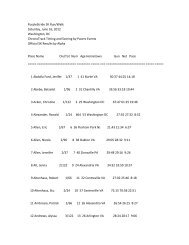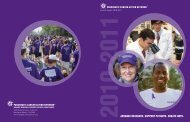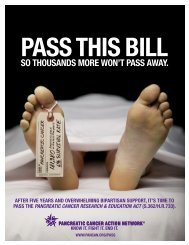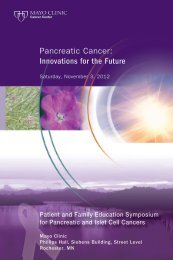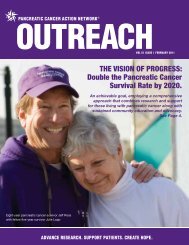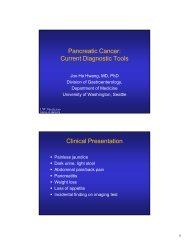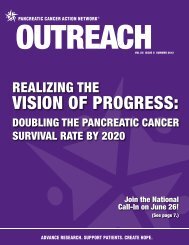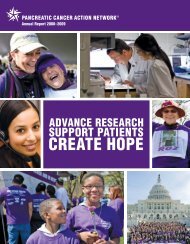Outreach July 2006 - Pancreatic Cancer Action Network
Outreach July 2006 - Pancreatic Cancer Action Network
Outreach July 2006 - Pancreatic Cancer Action Network
Create successful ePaper yourself
Turn your PDF publications into a flip-book with our unique Google optimized e-Paper software.
PATIENT AND LIAISON SERVICES (PALS)<br />
Family Registries<br />
Most cases of pancreatic cancer appear to<br />
occur sporadically with no previous family<br />
history of the disease. However, approximately<br />
5–10% of all pancreatic cancers are due to<br />
a positive family history, meaning at least<br />
one first degree relative (parent, sibling)<br />
was diagnosed with pancreatic cancer.<br />
Having a genetic susceptibility to pancreatic<br />
cancer does not mean that a person will<br />
develop the disease because risk is also<br />
affected by non-genetic factors including<br />
diet, lifestyle, and environment. Despite<br />
increasing research in the field of pancreatic<br />
cancer, understandings of the causes of this<br />
disease are still uncertain. Family registries<br />
have been established with the hope of<br />
discovering the causes of familial cancer.<br />
These family registries aim to uncover<br />
the unifying characteristics, genetic and<br />
otherwise, in families with multiple cases of<br />
pancreatic cancer.<br />
A pancreatic cancer family registry is a<br />
repository of information obtained from patients<br />
and their family members (blood relatives) and<br />
from individuals with a strong family history<br />
of pancreatic cancer. Registries examine<br />
lifestyle, environmental and genetic factors,<br />
in addition to family history of pancreatic<br />
cancer, genetic syndromes and other cancers<br />
that are believed to be associated with<br />
pancreatic cancer. Participation in a family<br />
registry usually requires the completion of<br />
questionnaires about individual and family<br />
medical history, family history of cancer,<br />
exposure to environmental agents, and<br />
demographic information including age,<br />
ethnicity, education, and occupational history.<br />
In addition, participants may be asked to<br />
provide biological specimens such as a<br />
blood or tissue sample for genetic testing.<br />
Family registries are commonly managed<br />
by a physician investigator and a study<br />
coordinator. All registries have been reviewed<br />
and approved by their respective Institutional<br />
Review Boards for enrolling participants and<br />
are required to protect the privacy of these<br />
individuals.<br />
To ensure privacy, unique study identification<br />
numbers are assigned to all information<br />
obtained from registry participants.<br />
Additionally, registries are protected by<br />
a Certificate of Confidentiality from the<br />
National Institutes of Health, Department of<br />
Health and Human Services. This certificate<br />
protects the personal information provided<br />
by families and affords researchers legal<br />
protection from having to involuntarily<br />
release any information. With this certificate,<br />
physician investigators cannot be forced<br />
by court order to disclose any protected<br />
health information which may identify registry<br />
participants.<br />
Family Registry Locations<br />
PanCAN is aware of the following pancreatic<br />
cancer family registries in the United States<br />
and Canada. Some of these registries are part<br />
of a consortium of sites, collectively known as<br />
the <strong>Pancreatic</strong> <strong>Cancer</strong> Genetic Epidemiology<br />
(PACGENE) consortium, funded by the National<br />
<strong>Cancer</strong> Institute.<br />
- Dana Farber <strong>Cancer</strong> Institute, Boston,<br />
MA<br />
- Evanston Northwestern Healthcare,<br />
Evanston, IL<br />
- Indiana University School of Medicine,<br />
Indianapolis, IN<br />
- Johns Hopkins Hospital, Baltimore, MD<br />
- Mayo Clinic, Rochester, MN<br />
- Memorial-Sloan Kettering <strong>Cancer</strong><br />
Center, New York, NY<br />
- University of Nebraska Medical Center<br />
and Creighton University, Omaha, NE<br />
- University of Oklahoma Health Sciences<br />
Center, Oklahoma City, OK<br />
- University of Pittsburgh Medical Center,<br />
Pittsburgh, PA<br />
- University of Texas – MD Anderson<br />
<strong>Cancer</strong> Center, Houston, TX<br />
- University of Utah Huntsman <strong>Cancer</strong><br />
Center, Salt Lake City, UT<br />
- University of Washington Medical<br />
Center, Seattle, WA<br />
- Wayne State University Karmanos<br />
<strong>Cancer</strong> Institute, Detroit, MI<br />
- Mount Sinai Hospital, Toronto, Ontario,<br />
Canada<br />
Please note that these registries are national<br />
and not limited to residents in the state of that<br />
particular registry; however, the family registry<br />
at Mount Sinai Hospital is limited to residents<br />
of Ontario, Canada.<br />
Family registries are an important key to<br />
unlocking the genetic basis of pancreatic<br />
cancer. Registries offer unique opportunities<br />
for interdisciplinary studies with clinicians<br />
and researchers from a variety of fields<br />
including epidemiology, gastroenterology,<br />
pathology, oncology, genetics and surgery.<br />
This collaborative approach has led to great<br />
advances in the field of pancreatic cancer<br />
research, but much more needs to be done.<br />
The participation of patients and family<br />
members is vital to furthering the understanding<br />
of pancreatic cancer and the development of<br />
new methods to diagnose and treat pancreatic<br />
cancer.<br />
For more information about family<br />
registries contact the PALS program at<br />
(877) 272-6226 or medinfo@pancan.org<br />
Thirty-nine pancreatic cancer survivors participated in a day of education at the <strong>Pancreatic</strong> <strong>Cancer</strong> Symposium – Chicago.<br />
<strong>July</strong> <strong>2006</strong> OUTREACH 9




